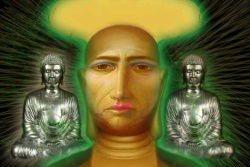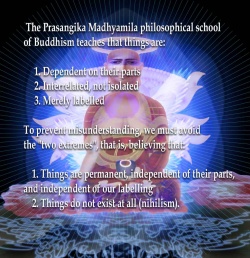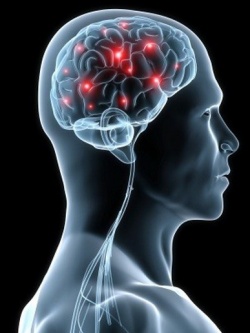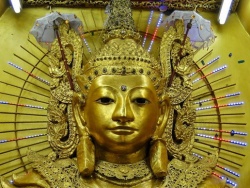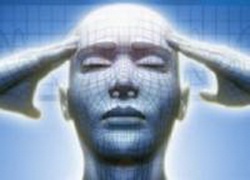Mental factors
Mental factors; (Sanskrit: Caitasika; Pali: Cetasika; Tibetan Wylie: sems byung), in Buddhism, are identified within the teachings of the Abhidharma (Buddhist psychology).
mental factors (Skt: chaitasika dharma; Tib: sem-lay jung-wa chö)
Literally arising from the mind, a mental factor, as defined by Vasubandhu, is a secondary aspect of the mind that apprehends a particular quality of the object that the principal consciousness is perceiving. There are traditionally 51 mental factors divided into six groups: five omnipresent factors, five object-determining factors, eleven virtuous factors, six root delusions, twenty secondary delusions and four changeable factors.
They are defined as aspects of the mind that apprehend the quality of an object, and that have the ability to color the mind.
Within the Abhidharma, the mental factors are categorized as formations (Sanskrit: Saṅkhāra) concurrent with mind (Sanskrit:Citta).
Alternate translations for mental factors (Sanskrit: Caitasika) include "mental states", "mental events", and "concomitants of consciousness".
Introduction
Mental factors are aspects of the mind that apprehend the quality of an object and have the ability to color the mind.
Geshe Tashi Tsering explains:
- The Tibetan for mental factors, semlay jungwa chö (Skt. chaitasika dharma), means phenomena arising from the mind, suggesting that the mental factors are not primary to the mind but arise within a larger framework.
A Mental factor, again, is defined as the aspect of the mind that apprehends a particular quality of an object.
Because it is characterized by the qualities of activity and non-neutrality, it has the ability to color the mind in dependence on the way it manifests.
Hence, a feeling of desire from seeing what is conceived as a beautiful object affects the other mental factors that are present at that time, and this colors the whole mind.
The relationship between the main mind (Sanskrit: Citta) and the mental factors can be described by the following metaphors:
- The main mind is like screen in a cinema, and the mental factors are like the images projected on the screen.
In this analogy, we typically do not notice the screen because we are so caught up on the images.
- The main mind is like a king who sits passively on a throne, and the mental factors are like the king's busy ministers.
Traleg Rinpoche states that the main distinction between the Mind and Mental Factors is that the mind apprehends an object as a whole, whereas mental factors apprehend an object in its particulars.
Lists of mental factors
Within Buddhism, there are many different systems of Abhidharma (commonly referred to as Buddhist psychology), and each system contains its own list of mental factors.
These lists vary from system to system both in the number of mental factors listed, and in the definitions that are given for each Mental factor.
These lists are not considered to be exhaustive; rather they present significant categories and mental factors that are useful to study in order to understand how the mind functions.
Some of the main commentaries on the Abhidharma systems that studied today include:
- Abhidhammattha-sangaha by Acariya Anuruddha - a Theravada commentary that lists fifty-two mental factors.
- Atthasālinī by Buddhaghosa - a Theravada commentary that provides explanations for fifty-two mental factors
- Abhidharma-kosha by Vasubandhu - a Sarvastivada commentary (studied by the Mahayana schools) that lists forty-six mental factors.
- Abhidharma-samuccaya by Asanga - a Yogachara commentary (studied by the Mahayana schools) that lists fifty-one mental factors.
- Innermost Core of Topics of Knowledge (mDzod-phug) by Shenrab Miwo - a Tibetan Bon commentary that lists fifty-one factors.
Theravāda Abhidharma tradition
Within the Theravāda tradition, the Abhidhammattha-sangaha enumerates the fifty-two mental factors listed below:
Seven universal mental factors
- Seven universal mental factors common to all; ethically variable mental factors common to all consciousnesses (sabbacittasādhāraṇa cetasikas)
Six occasional mental factors
- Six occasional or particular mental factors; ethically variable mental factors found only in certain consciousnesses (pakiṇṇaka cetasikas)
Fourteen unwholesome mental factors
Four mental factors of the hatred-group (dosa)
- Hatred (dosa)
- Envy (issā)
- Miserliness (macchariya)
- Regret (Kukkucca)
Other unwholesome mental factors
Twenty-five beautiful mental factors
Nineteen universal beautiful mental factors (sobhanasādhāraṇa)
- Lightness of mental body (kāyalahutā)
- Lightness of consciousness (cittalahutā)
- Softness/malleability of mental body (kāyamudutā)
- Softness/malleability of consciousness (cittamudutā)
- Readiness/wieldiness of mental body (kāyakammaññatā)
- Readiness/wieldiness of consciousness (cittakammaññatā)
- Proficiency of mental body (kāyapāguññatā)
- Proficiency of consciousness (cittapāguññatā)
- Straightness/rectitude of mental body (kāyujukatā)
- Straightness/rectitude of consciousness (cittujukatā)
Mahayana Abhidharma tradition
Abhidharma studies in the Mahayana tradition are based on the Sanskrit Sarvāstivāda Abhidharma system.
Within this system, the Abhidharma-samuccaya identifies fifty-one mental factors:
Five universal mental factors
The five universal mental factors (sarvatraga) are:
- Sparśa - contact, contacting awareness, sense impression, touch
- vedanā - feeling, sensation
- saṃjñā - perception
- cetanā - volition
- Manasikara - attention
These five mental factors are referred to as universal or omnipresent because they operate in the wake of every mind situation. If any one of these factors is missing, then the experience of the object is incomplete.
For example:
- If there is no Sparśa (contact), then there would be no basis for perception.
- If there is no Vedana (sensation), there is no relishing of the object.
- If there is no saṃjñā (perception), then the specific characteristic of the object is not perceived.
- If there is no cetanā (volition), then there is no movement towards and settling on the object.
- If there is no Manasikara (attention), then there is not holding onto the object.
Five object-determining mental factors
The five object-determining mental factors (viṣayaniyata) are:
- chanda - desire (to act), intention, interest
- Adhimoksha - decision, interest, firm conviction
- smṛti - Mindfulness
- prajñā - Wisdom
- Samādhi - concentration
The five factors are referred to as object-determining is because these factors each grasp the specification of the object.
When they are steady, there is certainty concerning each object.
Eleven virtuous mental factors
The eleven virtuous mental factors; (kuśala) are:
- sraddhā - faith
- hrī - self-respect, conscientiousness, sense of shame
- Apatrāpya - decorum, regard for consequence
- Alobha - non-attachment
- Adveṣa - non-aggression, equanimity, lack of hatred
- Amoha - non-bewilderment
- Vīrya - diligence, effort
- Praśrabdhi - pliancy
- Apramāda - conscientiousness
- upekṣa - equanimity
- ahiṃsā - nonharmfulness
Six root unwholesome factors
The six root unwholesome factors (mūlakleśa) are:
- raga - attachment
- Pratigha - anger
- avidya - ignorance
- māna - pride, conceit
- Vicikitsa - doubt
- dṛiṣṭi - wrong view
Twenty secondary unwholesome factors
The twenty secondary unwholesome factors (upakleśa) are:
- krodha - rage, fury
- Upanāha - resentment
- Mrakśa - concealment, slyness-concealment
- Pradāśa - spitefulness
- Irshya - envy, jealousy
- mātsarya - stinginess, avarice, miserliness
- māyā - pretense, deceit
- śāṭhya - hypocrisy, dishonesty
- mada - self-infatuation, mental inflation, self-satisfaction
- vihiṃsā - malice, hostility, cruelty, intention to harm
- āhrīkya - lack of shame, lack of conscience, shamelessness
- Anapatrāpya - lack of propriety, disregard, shamelessness
- Styāna - lethargy, gloominess
- Auddhatya - excitement, ebullience
- āśraddhya - lack of faith, lack of trust
- Kausīdya - Laziness, slothfulness
- Pramāda - heedlessness, carelessness, unconcern
- muṣitasmṛtitā - forgetfulness
- Asaṃprajanya - non-alertness, inattentiveness
- Vikṣepa - distraction, desultoriness
Four changeable mental factors
The four changeable mental factors (aniyata) are:
- Kaukṛitya - regret, worry,
- Middha - sleep, drowsiness
- Vitarka - conception, selectiveness, examination
- Vicāra - discernment, discursiveness, analysis
Alternate translations
Alternate translations for the term mental factors (Sanskrit: Caitasika) include:
- Mental factors (Jeffrey Hopkins, Bhikkhu Bodhi, N.K.G. Mendis)
- Mental events (Herbert Guenther)
- Mental states (Erik Pema Kunzang, Narada Thera)
- Concomitants (N.K.G. Mendis)
- Concomitants of consciousness (Bhikkhu Bodhi)
- Subsidiary awareness (Alexander Berzin)


